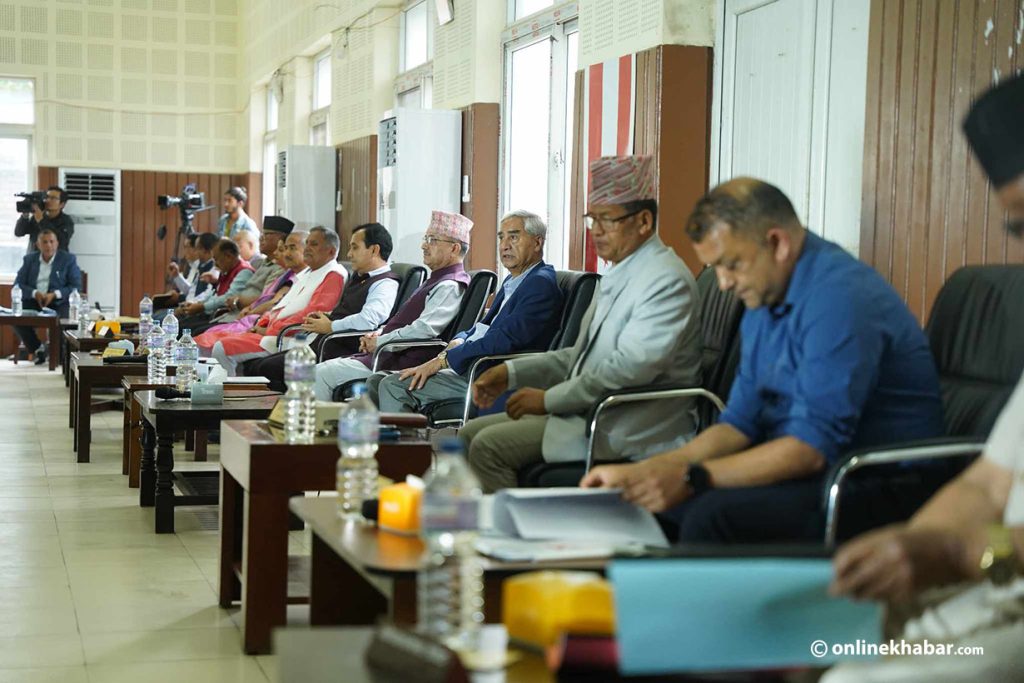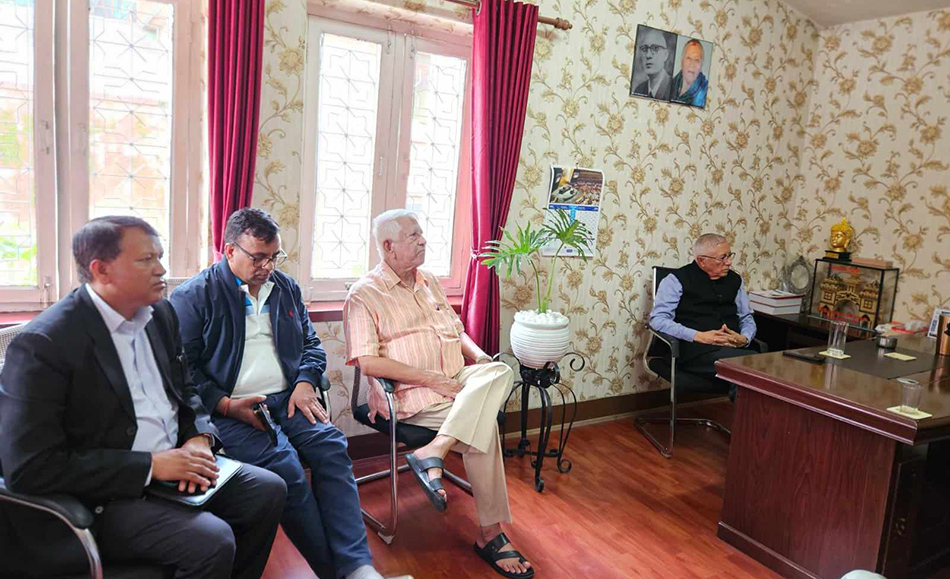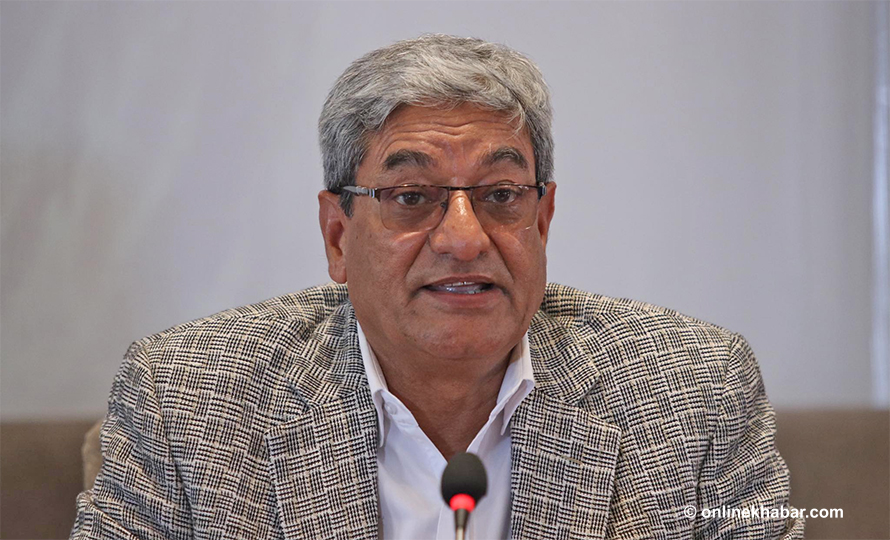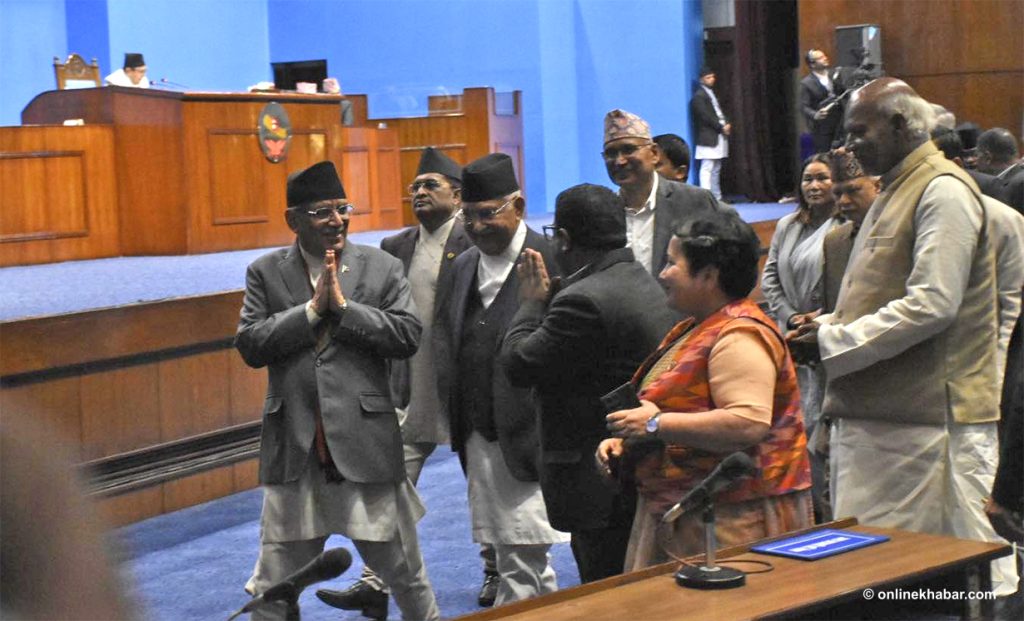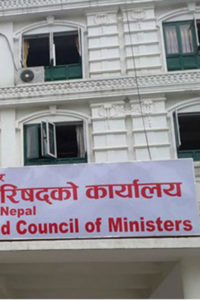
While contesting for the post of general secretary in the 14th national convention of the Nepali Congress, Gagan Thapa appealed for the party members to vote for him as he said he aimed to transform the party. Explaining the role of the general secretary, he said, “The first job of a general secretary is to enforce the party statute on all the members, including the party president.”
To do so, Thapa along with his fellow general secretary Bishwa Prakash Sharma held a meeting with the party’s district presidents. The other objective of the meeting was to train the party about the online system adopted by the party for membership distribution and to make the party more active by conducting a conference at all levels.
According to the Nepali Congress’ statute, the role of the general secretary is to make the organisational structure of the party active and effective. They also have to disseminate information about party-related activities to the various bodies within the party when needed and implement and supervise the decisions and programs of the party.
The meeting, which was called to strengthen the party, created hullabaloo within the party. Both the general secretaries were accused of holding meetings without consulting the party president. However, general secretaries provided clarification that the meeting was conducted only after consulting with the party president which goes to show the level of influence the party president has.
Hoping against hope

The result of the 14th national convention that was held on December 13, 2021, brought excitement to the party. Although the party did not see a change in the president, there were dozens of changes in office bearers along with central members.
One and a half years have passed since the convention. As the performance of the working committee is being assessed, there is also a close examination of the two general secretaries who were anticipated to drive substantial changes within the party. A key question being raised is whether Thapa and Sharma have succeeded in liberating the party from the old system that had been in place.
While they have tried to create change within the party, leaders close to Thapa and Sharma say that both of them are not satisfied with their performance as general secretary.
“As a leader, they can’t blame others for not being able to work efficiently,” says a leader close to the party.
According to Ram Hari Khatiwada, a central member of the Nepali Congress, both Thapa and Sharma have failed as general secretaries as they have not played a significant role in strengthening the party.
“They have not coordinated with the party president. All they have done is criticised him. That is not how you strengthen the party,” says Khatiwada who calls for the two general secretaries to take part in healthy politics.
But according to anti-establishment leaders within Nepali Congress, there is a growing sense of momentum thanks to the contributions of the two general secretaries. However, they also express concerns about the duo’s perceived weakness in decision-making during general committee meetings, policy conventions, changes in the ticket distribution system, nationwide campaigns, and other key aspects.
According to the statute of the Nepali Congress, the meeting of the central committee must be held once in two months. The first meeting of the central committee following the convention took place in accordance with the party’s statutes. During this meeting, the general secretaries were reportedly successful in ensuring that Nepali Congress President Sher Bahadur Deuba adhered to the party’s regulations and guidelines.
“But three months later, Deuba stopped following the party statute,” says an anti-establishment leader. He started postponing the issues raised by general secretaries. The meeting of the central committee which is supposed to take place once every two months was called after one year, scheduled for July 12.
The meeting of the performance committee has also been delayed as it has not met since deciding to vote in favour of Pushpa Kamal Dahal to become the prime minister. According to the party statute, the meeting must take place every month.
According to Nepali Congress leaders, Deuba tried to take the decision to vote for Dahal on his own. For that, he held a meeting of the senior leaders of the party at his residence on January 9 and 10. But the two general secretaries took a stand and held a meeting of the performance committee to discuss whether to give a vote of confidence.
Following that, the meeting was held at the Lhoste Hall of the parliament building. The majority in the meeting decided to give a vote of confidence to Dahal despite Dahal being part of the coalition with the UML.
Thapa, however, was against it. He has been against the coalition since the start but he could do nothing.
“We will try our best but at the end of the day, the party is more than just us. Decision on how the party moves forward is taken together,” says Thapa.
Thapa before the election said he wants to be parliamentary party leader. He tried to contest Deuba too but he was heavily defeated by Deuba who still holds all the cards in the Nepali Congress. Speaking at a programme on July 8, Thapa said he still has hope of becoming the parliamentary party leader someday.
No help from above

During this period, Deuba effectively utilised the expertise and roles of both general secretaries. He utilised Thapa to ratify the Millennium Challenge Corporation (MCC) in the House of Representatives.
“He knew people will not be convinced if he spoke so he asked Thapa to do it,” says a central member of NC.
The by-election of Tanahun 1 was considered a fight for prestige. Swarnim Wagle, who left the party because of Deuba, was contesting against the Nepali Congress as he had joined the Rastriya Swatantra Party. To ensure he does not win, Deuba again turned to Thapa and Sharma to help in the campaign at Tanahun 1. Despite their best efforts, Wagle won big leaving Nepali Congress with an egg on their face.
It appears that the general secretaries made efforts to activate and strengthen the party structure at all levels. In March, they issued directives for all levels, from local to provincial, to operate in accordance with the party statute. Similarly, in May, they instructed all levels to conclude their respective meetings.
Besides that, they also sent letters to wards, municipalities, provinces and districts to do meetings at all levels. The Nepali Congress central committee also sent the format of the meeting. According to the statute, all levels must conduct a conference each year except the year of the convention.
Over two dozen districts have already concluded the meeting. The remaining districts are also actively holding the meeting, claims the party. The district presidents have committed to concluding the meeting within August.
Nepali Congress has started a new practice in the party. It has begun distributing online membership. Previously, membership distribution and renewal used to be done only in the year of the convention. However, the statute disallows the distribution and renewal of membership in the year of the convention. Currently, membership renewal is taking place at the ward level.
Prior to the 14th national convention, Deuba was blamed for not following the party’s statute. Deuba has not changed his ways and despite their best efforts, the general secretaries have not been able to change Deuba either.
Despite the expectation of forming multiple departments within six months, only the head of the publicity department has been appointed so far. The general secretaries had made a request in June to establish at least five departments by June 25.
But their requests have been unheeded. The central committee and performance committee are not full. The central committee which is supposed to have 168 members only has 151 members. Likewise, according to the party’s statute, there should be 46 members in the performance committee but it only has 37 so far.
By now the department and the sister organisations of the Nepali Congress should have been more active. But they are not, says Khatiwada who blames the leadership for failing to hold central committee and performance committee meetings.
On February 15, 2022, 10 sister organisations, including Tarun Dal and Nepal Student Union, were dissolved to form an ad hoc committee by giving a mandate to hold a convention within three months of the completion of the three-level elections. So far, only NSU has a president.
Recently a 400-member ad hoc committee of Tarun Dal was formed. Although some members have been added to the Women and Dalit Association, it has not got complete shape. In this too, general secretaries have failed to make the party president follow the party’s statute.
However, central members claim that President Deuba nominated the chair of sister organisations without informing both the general secretaries.
“President Deuba makes decisions as per his need but ignores the task necessary for the party’s benefit, ” says a central member.
This story was translated from the original Nepali version and edited for clarity and length.






